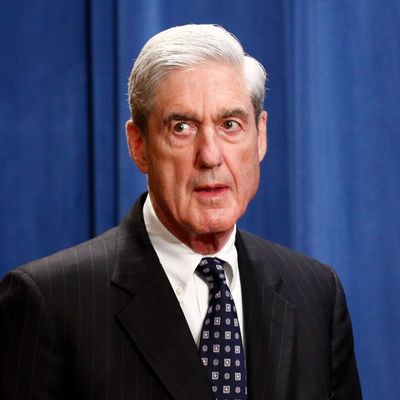
Famously taciturn prosecutor Robert Mueller decided to address the public to make it very clear that he did not exonerate President Trump of committing obstruction of justice. “If we had confidence that the president did not commit a crime we would have said so,” he said. Mueller cited a Department of Justice policy prohibiting a special prosecutor from charging sitting presidents: “Charging the president with a crime,” he said, “was therefore not an option we could consider.”
This banal point is important because it pithily clarifies something Trump and his allies have labored, with quite a bit of success, to obscure. Attorney General William Barr’s letter summarizing Mueller’s report presents the report as being inconclusive about the facts of Trump’s conduct. “The Special Counsel considered whether to evaluate the conduct under Department standards governing prosecution and declination decisions but ultimately determined not to make a traditional prosecutorial judgment,” wrote Barr. “The Special Counsel therefore did not draw a conclusion — one way or the other — as to whether the examined conduct constituted obstruction.”
That is wrong. Mueller was not failing to draw a conclusion about the conduct. He was concluding decisively that he did not have the power to define Trump’s conduct as a crime.
Even after Mueller objected to Barr’s characterization, Barr repeated this distortion in his public testimony. “The role of the federal prosecutor,” he said, is “either to commence or to decline prosecution.” Barr emphasized that “the appointment of a Special Counsel and the investigation of the conduct of the President of the United States do not change these rules.”
(This was flatly contradicted by Mueller, who reminds us the appointment of a special prosecutor does change these rules.)
Barr’s testimony jumped off this false premise to present Mueller as having been unable to decide if Trump’s conduct was bad enough to qualify as criminal obstruction: “The Special Counsel decided not to reach a conclusion, however, about whether the President committed an obstruction offense.” This was at best highly misleading: Mueller “decided” he lacked the legal standing to charge Trump with a crime.
After Barr released his letter misleadingly spinning Mueller’s finding, a reporter asked Barr if Mueller was throwing the question of presidential criminality over to Congress to settle through impeachment. No, Barr said, he wasn’t: “Special Counsel Mueller did not indicate that his purpose was to leave the decision to Congress; I hope that was not his view, since we don’t convene grand juries and conduct criminal investigations for that purpose.”
In his statement today, Mueller rebutted Barr on this, too. The Department of Justice legal opinion prohibiting him from charging a president with a crime instead “says that the Constitution requires a process other than the criminal justice system to formally accuse a sitting president of wrongdoing.” In other words, yes, Mueller was throwing it to Congress, and no, Barr was not telling the truth about this, either.
Trump is spinning Mueller’s statement the same way he and Barr spun the report: pretending Mueller’s statement that he cannot bring charges means the evidence was insufficient.
Hundreds of former federal prosecutors signed a letter stating that Trump’s conduct would be chargeable as a crime if he was not the president. Mueller’s view is that it’s up to Congress, not him, to make that decision. Trump and his loyal attorney general have decided to continue misleading the public about why Mueller did not formally accuse the president of crimes.
An official statement from the Department of Justice and Office of Special Counsel tries to leave the impression Mueller was not contradicting his boss:
But this carefully worded statement obscures more than it clarifies. The Washington Post cracks the code. Mueller reportedly believes “it would be improper for him to say that the president would be charged with obstruction if it were not for the Justice Department policy, because saying that would also amount to a criminal accusation against Trump, according to people involved in the discussion.” So Mueller can’t outright say only Department policy prevented him from charging Trump with a crime, because that’s the same thing as accusing him of a crime, which he can’t do.
Likewise, the Post reports, “Mueller’s team came to believe that making any sort of impeachment referral to Congress also would fall under the category of accusing the president of a crime.” So Mueller can’t explicitly say he would have charged Trump with a crime if he could have, and he also can’t explicitly tell Congress to impeach the president. Instead he’s heavily hinting at both points. And Barr, who has been using Mueller’s restraint to mislead the country about what Mueller concluded, has been exposed as the liar he is.
This post has been updated.






























